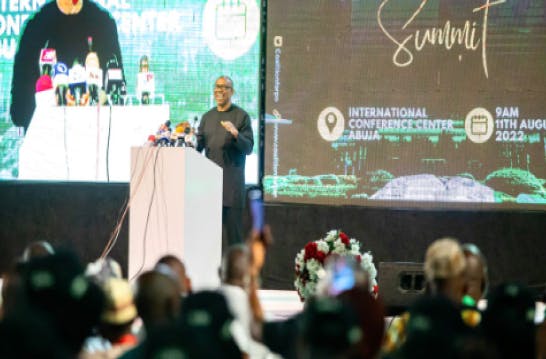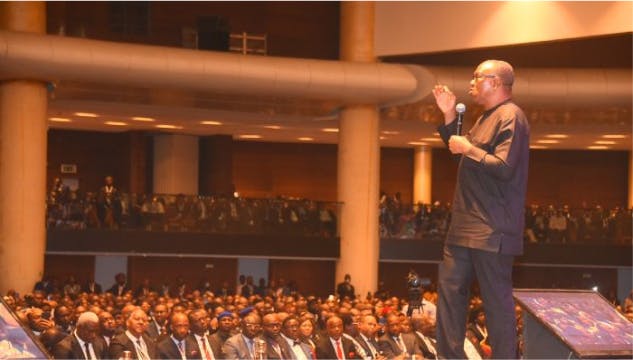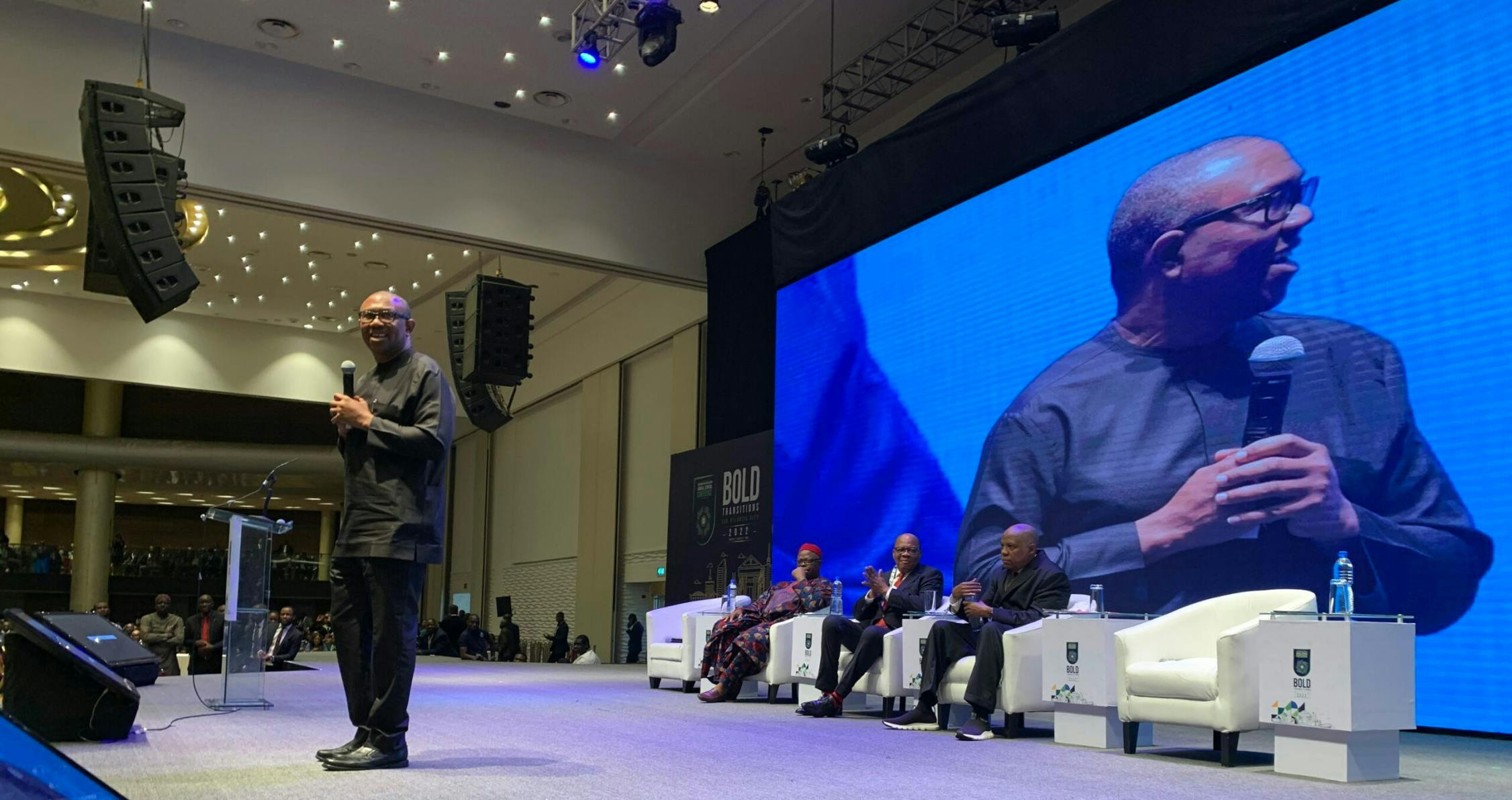BIOGRAPHY

EARLY LIFE AND EDUCATION
Peter Gregory Obi (CON), was born on 19 July 1961 at Onitsha. He attended Christ the King College, Onitsha, where he completed his secondary school education. He was admitted to the University of Nigeria, in 1980, graduating with a B.A. (Hons) in philosophy in 1984.
He also attended the Kellogg School of Management of Northwestern University; Saïd Business School of Oxford University and the Judge Business School of Cambridge University.
Peter Obi attended Lagos Business School, where he completed the Chief Executive Program; Harvard Business School, where he completed two programs; The London School of Economics; Columbia Business School; And the International Institute for Management Development where he received certificates in the Senior Executive Program and the Chief Executive Officer Program.
POLITICAL CAREER
TIMELINE
-

PRE-POLITICAL CAREER
Peter Obi was a successful businessman before he ventured into politics. He started his life as a trader, being born into trading family before venturing into the corporate world. He held leadership positions in some private establishments. Some of the companies he served includes: Next International Nigeria Ltd, Chairman and director of Guardian Express Mortgage Bank Ltd, Guardian Express Bank Plc, Future View Securities Ltd, Paymaster Nigeria Ltd, Chams Nigeria Ltd, Data Corp Ltd and Card Centre Ltd. He was the youngest chairman of Fidelity Bank Plc.
-

FIRST TERM
2006 - 2010
Peter Obi contested in the Anambra State governorship election as candidate for the All Progressives Grand Alliance (APGA) party in 2003, but his opponent, Chris Ngige of the People's Democratic Party, was declared winner by the Independent National Electoral Commission (INEC).
After nearly three years of litigation, Ngige's victory was overturned by the Court of Appeal on 15 March 2006. Obi took office for on 17 March 2006. On 2 November 2006, he was impeached by the state house of assembly after seven months in office and was replaced the next day by Virginia Etiaba, his deputy, making her the first-ever female governor in Nigeria's history. Obi successfully challenged his impeachment and was re-instated as the governor on 9 February 2007 by the Court of Appeal sitting in Enugu. Etiaba handed power back to him after the court ruling.
Obi once again left office on 29 May 2007 following the general elections, which Andy Uba won. Obi returned to the courts once more, this time contending that the four-year tenure he had won in the 2003 elections only started to run when he took office in March 2006. On 14 June 2007 the Supreme Court of Nigeria upheld Obi's contention and returned Obi to office. This brought to an abrupt end the tenure of Obi's successor, Andy Uba whose 14 April 2007 election the Supreme Court nullified on the grounds that Obi's four-year tenure should have remained undisturbed until March 2010.
-

SECOND TERM
2011 - 2015
On 7 February 2010, the Independent National Electoral Commission (INEC) declared Peter Obi the winner of the 2010 Anambra State gubernatorial election, where he defeated Professor Charles Chukwuma Soludo, former governor, CBN. This election victory gave Governor Obi an additional four years as the governor of Anambra State. On 17 March 2014, Peter Obi served out his second term and handed over the governorship to Willie Obiano. After the 2015 general election, President Goodluck Jonathan appointed Peter Obi as the chairman of the Nigerian Security and Exchange Commission (SEC).
-

PRESIDENTIAL ELECTIONS
2019
On 12 October 2018, Peter Obi was named as the running mate to Atiku Abubakar, the Peoples Democratic Party's Presidential Candidate in the Nigerian 2019 Presidential elections. His party came second.
On 24 March 2022, Peter Obi declared his intention to run for the position of President of Nigeria under the platform of the Peoples Democratic Party, but later pulled out and announced he would be running under the Labour Party platform instead. Accordingly, Peter Obi wrote to the leadership of the Peoples Democratic Party of resigning his membership.
An Obidient Call To Serve His Nation
In the run-up to the 2023 General Elections in Nigeria, Obi has become the voice of hope for a better Nigeria, presenting himself as a Presidential Candidate under the Labour Party. His candidacy has rekindled a belief in the possibility of Nigeria toeing a new path, away from entrenched corruption that has held it back for years, especially due to his standing as a significant candidate unaffiliated with either of Nigeria's two older parties.
Obi's 2023 presidential campaign has received widespread support, notably among young Nigerians, who have self-organized and championed his cause while referring to themselves as Obi-dients. His supporters believe that his integrity, efficient resource management, business acumen, respect for the rule of law, security antecedents in Anambra and overall focus on developing human capital are what Nigeria requires to regain its pride of place in the world.
Obi, who is married to Margaret Brownson Obi (Nee Usen), has two children, and has garnered various national and international honours, including Commander of the Order of Niger (CON), one of Nigeria’s national honours.



Continuous Contribution to Nation Building
Following the end of his tenure as the Governor of Anambra State, Obi was appointed the Honorary Special Adviser to the President on Finance, a position he held until May 2015, while also serving as a member of the Presidential Economic Management Team. Given his efficient management of state funds as governor, and his establishment of a healthy reserve for his successor, his contributions were thought to be invaluable to the nation, hence his additional national duties, which he fully executed until a new federal government was sworn-in.
Despite being out of government since 2015, Obi has become one of the most recognizable voices for a new Nigeria, one where character and competence are at the base of what it takes to lead the government and any of its agencies. Through various engagements and shared opinions, he has established the need for a more cost-sensitive and effective government where corruption is greatly reduced, and transparency of process is commonplace.
In 2019, as Vice Presidential candidate of the Peoples Democratic Party, he raised and drove the conversation for Nigeria and Nigerians to switch to a production mindset and economy, and ensure that the nation’s resources were properly managed to yield the best results.
